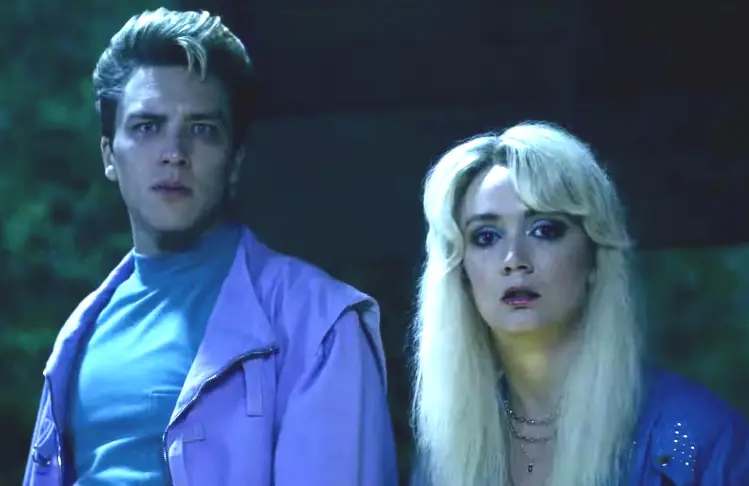We're Glad the Dead Don't Die on American Horror Story: 1984
-
 Cody Fern and Billie Lourd in American Horror Story: 1984 (FX)
Cody Fern and Billie Lourd in American Horror Story: 1984 (FX)When it comes to resurrection, it’s not just cast members and characters that American Horror Story loves bringing back, it's also the idea of a cursed place that never lets you die. From the mansion in Murder House and Apocalypse to the Hotel Cortez in Hotel, AHS has created multiple settings that trap the spirits of those who perish there. This has resulted in stories that are touching, horrifying, and devastating — and sometimes all three at once. (Remember the grotesque yet weirdly moving moment in season one when Constance tries to drag her daughter’s body on to the Murder House property, so the kid will die there and therefore stick around forever?)
This trope returned again in American Horror Story: 1984, which airs its finale tonight, with everyone who dies on the grounds of Camp Redwood instantly returning as a ghost that can’t leave. This season has pushed this device into new territory, though, which has made it especially exciting to watch.
For one thing, as the final episode looms, there are many characters conspiring to kill people, and they all have different motivations.
First, there’s the unhinged serial killer Margaret Booth (Leslie Grossman), who is planning to stage a music festival at the camp. She wants to kill all the bands, believing that the same folks who flock to Jim Morrison’s grave will come to Redwood to see the final resting place of Kajagoogoo and the Go-Gos. Since she owns the place, she figures she’ll make a fortune charging admission fees.
Meanwhile, the ghosts of the many counselors who were killed in the titular 1984 massacre want to slaughter everyone who attends Margaret’s festival, because they assume the mass murders will attract so much attention that someone will figure out how to free them from their purgatory.
This is a lot of plot, but there are some fascinating messages intermixed. Since Margaret’s plan involves real-life 80s bands, we’re confronted with an uncomfortably specific critique of our own nostalgia. Are we all part of a culture that would prefer to metaphorically murder our favorite artists instead of letting them change? Isn’t that the endpoint of our obsession with the cultural past? Isn’t something similar happening when we flock to see zombie versions of classic rock bands that no longer have any of their original members, or when filmmakers seek to animate the corpse of James Dean to put him in a new movie?
And what does it mean that AHS: 1984, of all things, is making this argument? The show itself is a riff on 80s horror films, and it makes jokey references to everything from Jazzercise to VHS porn. It’s lured us with the promise of nostalgia, only to show us just how treacherous said nostalgia can be. That’s a pretty sharp way to turn the "never quite dead" device into an analytical tool.
The murdered campers use the device to create existential dread. While ghost characters in previous seasons have certainly wanted to leave the world once and for all, this year’s group has essentially formed a union. They’re working collectively to bring attention to their plight, and they’re killing new people to expand their ranks. That’s particularly terrifying, because how many times have we seen a scared and desperate mob inflict harm on others in some backward belief that it will make them safer?
And of course, the end result for the mob (both fictional and actual) is almost always disastrous. Bringing more people into your misery doesn’t do anything but make more people miserable. It’s been moving to see Montana Duke (Billie Lourd) figure this out over the course of the season, as she’s evolved from a vengeful villain into a figure of remorse. Now that she understandsds how much pain she’s caused, it will be interesting to see if she becomes a moral corrective in the finale.
But maybe that’s not possible. After all, we’ve already seen Benjamin Richter (John Carroll Lynch) try to redeem his old sins and protect other people by killing himself on the Redwood grounds. However, instead of stopping Richard Ramirez’s murder spree like he planned, Richter wound up hiding out with the ghosts of his own dead brother and mother. It played as a sweet moment when they settled in for an eternal picnic by the camp’s lake, but was it? Might it have actually been a cowardly retreat from reality?
Montana may end up in a similar place, too exhausted by the loop of suffering to resist it. It’s possible she’ll just hang her head in shame as the poor members of Kajagoogoo are forced to play "Too Shy" forever. Or maybe the band will somehow be the key to freeing everyone from limbo. The season has told such a surprising story that pretty much anything seems possible.
People are talking about American Horror Story: 1984 in our forums. Join the conversation.
Mark Blankenship has been writing about arts and culture for twenty years, with bylines in The New York Times, Variety, Vulture, Fortune, and many others. You can hear him on the pop music podcast Mark and Sarah Talk About Songs.
TOPICS: American Horror Story: 1984, FX, Billie Lourd, John Carroll Lynch, Leslie Grossman, Ryan Murphy
- Our Favorite Olympic-Themed TV Episodes
- Sarah Paulson opted to sit out a season of American Horror Story to film Mrs. America
- American Horror Story: 1984's Zach Villa says he didn't see the full season finale script until a few weeks ago
- Leslie Grossman appreciated her "lovely ending" in American Horror Story: 1984